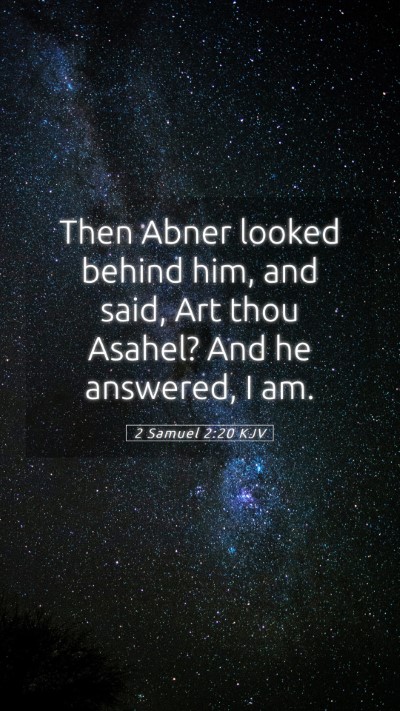Understanding 2 Samuel 2:20 - A Detailed Commentary
In this analysis of 2 Samuel 2:20, we explore the deeper meanings and interpretations as provided by respected Bible commentaries. This scripture is rich with insights that aid in achieving a comprehensive understanding of the text.
Verse Context and Content
2 Samuel 2:20 states, "And Abner looked behind him, and said, Is it thou, Asahel? And he answered, It is I." This is part of the narrative surrounding the leadership struggle during the early years of David's reign, specifically the conflict with the house of Saul.
Commentary Insights
- Matthew Henry's Commentary: Henry emphasizes the character and resolve of Asahel, who is depicted as a youthful and valiant warrior. His determination to pursue Abner highlights the fervor of ambition and loyalty, yet also raises questions about the wisdom of his actions. Asahel’s decision ultimately leads him to his peril.
- Albert Barnes' Notes: Barnes considers the implications of Abner recognizing Asahel. This moment signifies a confrontation filled with emotional tension—Abner, a seasoned general, faces a young man eager to prove himself. The psychological depth here reflects the themes of ambition, loyalty, and the consequences of youthful rashness in battle.
- Adam Clarke's Commentary: Clarke expands on the significance of Abner’s question. Abner’s inquiry underscores the personal nature of conflict and the recognition of identity in warfare. He highlights the precarious reality that individuals face in battles where personal relations intertwine with power struggles, as reflected in the ongoing conflict between the house of Saul and David.
Thematic Analysis
The verse encapsulates themes such as:
- Ambition and Courage: Asahel’s pursuit of Abner is indicative of his valor but also raises ethical questions regarding ambition without wisdom.
- Civil Strife: The conflict illustrates the deeper issues of loyalty and the divided nature of Israel at this time, as well as the personal sacrifices made in the pursuit of power.
- Identity in Conflict: The exchange between Abner and Asahel reflects the broader theological and moral questions regarding the nature of leadership and the implications of historical conflict.
Application of the Verse
This verse can be seen as a metaphor for the conflicts in our lives that arise from ambition and personal loyalties. It invites readers to reflect on:
- How ambition shapes our actions and the potential consequences of not considering our decisions carefully.
- The importance of recognizing the deeper human connections amidst conflicts, reminding us that battles are not merely political but are often deeply personal.
- The necessity of wisdom in navigating personal and communal strife, balancing loyalty to allies while recognizing the moral ramifications of our choices.
Cross References
Further examination of the following verses can enrich understanding of 2 Samuel 2:20:
- 2 Samuel 2:18 - Discusses Asahel’s character further.
- 1 Samuel 26:8-10 - Reflects on the tensions during David's rise.
- Proverbs 20:3 - Provides wisdom regarding conflicts and discretion.
Conclusion
2 Samuel 2:20 serves as an excellent meditation point for those looking to delve into Bible verse meanings and interpretations. By exploring commentaries and applying their teachings, readers can gain enriched insights that lead to a better understanding of scripture and personal application in everyday life.
This analysis connects to broader theological discussions within Bible study groups and enriches online Bible study platforms. It emphasizes the importance of critical thinking and applying biblical teachings in today's world, aiding both seasoned scholars and novices seeking to deepen their understanding of Scripture.


